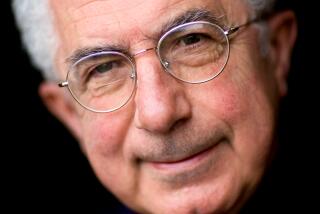A History of Histories of the Holocaust : THE HOLOCAUST IN HISTORY<i> by Michael R. Marrus (University Press of New England: $16.50; 255 pp;) </i>
- Share via
Historians, as Michael R. Marrus notes, were latecomers to a discussion of the Shoah , the Holocaust. In the beginning was denial. Jews, too traumatized by what they had experienced, had no desire to relive it in words. Others, it seems, had no interest. When the Shoah finally forced itself into the realm of discourse, it was treated mythically or in theological terms. In this mode, Elie Wiesel protested that the subject “defies imagination and perception. It submits only to memory. . . . Between the dead and the rest of us exists an abyss that no talent can comprehend.”
Finally, a full decade and a half after the events did historians move them out of the intellectual ghetto to which they had been relegated. Spurred, perhaps, by the Adolf Eichmann trial in Jerusalem, scholars deemed the Holocaust a fit subject for academic study. Today, a select bibliography lists 2,000 book entries--and 10,000 publications--on Auschwitz alone.
Marrus, professor of history at the University of Toronto, attempts not a history of this most significant--and shattering--event in Jewish history in two millennia, but a historiography. He is concerned less with the events themselves than how they have been understood and portrayed. He assesses the way various historians have treated such subjects as the development of the mechanisms of the “final solution,” the responses of its victims, and of bystanders. How did world leaders respond? World Jewry? He is insistent on applying the professional historian’s gift for making fine distinctions. In the process, he touches on issues that may strike the non-specialist as arcane: the extent of anti-Semitic attitudes in Germany, in various East European countries, assessments of collaboration with--or resistence to--imposition of the final solution in vanquished countries, the precise number of Jews who perished--whether it was 5.1 million or 5.8 million or 6 million.
Marrus’ work serves both as an admirable introduction to a historical approach to these events and an attempt to create a synthesis of the opinions of the most significant writers. The work is interesting for that aspect, though Marrus at times appears uncertain about which path he wishes to follow. He succeeds in creating a valuable overview of the significant works that treat each of the pertinent subjects--sort of a grand annotated bibliography of the current state of historical discussion of the Holocaust.
The close reading of facts, in the best of historians, as represented here is an important corrective to those who are tempted to trade in too-easy generalizations about the events, or those who would distort facts to serve their own political or ideological ends. Marrus is especially fine in tempering criticism of Jewish leaders in Europe and the United States, reminding us that they did not know, while events were overwhelming them, what we now know in the light of a kindlier day. This perspective itself is a valuable contribution.
For many, it is still difficult and painful to read even so dispassionate a treatment of the Shoah . Not, at this date, out of trauma; but out of visceral pain. Beyond that, one reads even as impressive a work as this with the certainty that significant facts still remain to be discovered and revealed. Perhaps above all, one feels that, in the end, the answers of the historians do not illuminate that darkness. Even as fine a book as this is ultimately unsatisfying. One is left with the sense that the real significance and meaning of that tremendum is not to be found in the details. The Shoah talks, most compellingly, in other realms--those treated by psychology and theology. It is finally meaningful not so much in the deeds that were done more than 40 years ago, but of what they say about the order of the world, and of the human soul.
More to Read
Sign up for our Book Club newsletter
Get the latest news, events and more from the Los Angeles Times Book Club, and help us get L.A. reading and talking.
You may occasionally receive promotional content from the Los Angeles Times.










